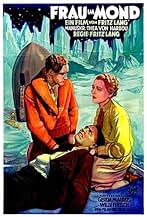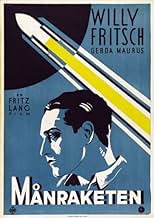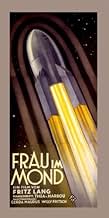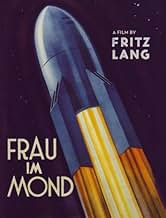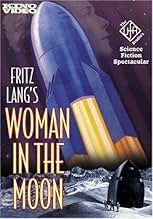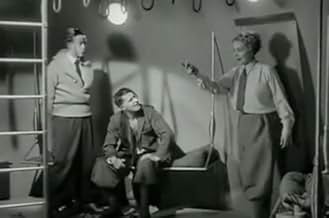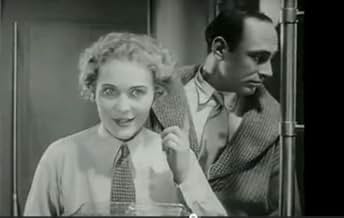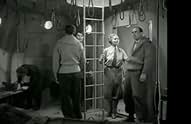IMDb RATING
7.3/10
4.1K
YOUR RATING
A tenacious scientist blasts off for the moon in hopes of riches that may be found there.A tenacious scientist blasts off for the moon in hopes of riches that may be found there.A tenacious scientist blasts off for the moon in hopes of riches that may be found there.
- Awards
- 1 nomination total
Gustl Gstettenbaur
- Gustav
- (as Gustl Stark-Gstettenbaur)
Gustav von Wangenheim
- Hans Windegger - Engineer
- (as Gustav v. Wangenheim)
Alexa von Porembsky
- Eine Veilchenverkäuferin
- (as Alexa v. Porembska)
Heinrich Gotho
- Der Mieter vom II. Stock
- (as Gotho)
Alfred Loretto
- Zwei eindeutige Existenzen
- (as Loretto)
Max Maximilian
- Grotjan, Chauffeur bei Helius
- (as Maximilian)
Edgar Pauly
- Zwei eindeutige Existenzen
- (as Pauly)
Karl Platen
- Der Mann am Mikrophon
- (as Platen)
Mahmud Terja Bey
- Fünf Gehirne und Scheckbücher
- (as Terja Bey)
Hermann Vallentin
- Fünf Gehirne und Scheckbücher
- (as Vallentin)
Featured reviews
As Martin Sheen said in the fine documentary "Space," this movie deals seriously with almost every aspect of a flight to the moon. It makes some dreadful errors that, even in 1929, could and should have been avoided (an atmosphere on the moon, for example). But, it nevertheless treats the subject and the viewer with respect. When I saw this movie at a New York revival house, a live pianist provided the silent film's accompaniment. I encourage you to see it this way, as that somehow made it even easier to put myself in the place of an early 20'th century filmgoer, and see this fine movie for what it was. The story is light, but the beckoning mystery of outer space is captured in a way that will make you feel you know something more than you used to about the people who made, and first saw, these images. And, when you do, remember that real space flight was 30 _years_ away. (Later, you might ponder that the first lunar landing is now _more_ than 30 years ago, but do that after you enjoy this sweet look at, as Fred Pohl put it in another, related, context, "the way the future was.")
One extra bit of advice: Keep your ears open at the moment of launch. All of the effects in this movie are, naturally, simple and gray-haired. Nevertheless, when the rocket actually took off, my audience gave an audible reaction because, I think, Lang decided to emphasize an aspect of what a rocket is, and what it can do, that virtually all later film-makers have decided to ignore. They should see this movie, and learn a little something.
One extra bit of advice: Keep your ears open at the moment of launch. All of the effects in this movie are, naturally, simple and gray-haired. Nevertheless, when the rocket actually took off, my audience gave an audible reaction because, I think, Lang decided to emphasize an aspect of what a rocket is, and what it can do, that virtually all later film-makers have decided to ignore. They should see this movie, and learn a little something.
This was Fritz Lang's last silent film. It is a science fiction adventure in which a scientist, Professor Georg Manfeldt, had theorized that there were large supplies of gold on the moon. He was ridiculed by his peers and disgraced because of this. However, a wealthy industrialist believes Manfeldt's theory and has been building a rocket to travel to the moon. when a group of wealthy men who control the world's gold supply feel threatened by the possibility the theory may be correct, they threaten to destroy the rocket unless one of their agents, Turner, is allowed to go on the expedition too. Apparently Lang's film got so much right about space travel that the Germans seized the models used in the film as state secrets when they started their own rocket-building program. This film runs 169 minutes and is quite slow in places. It has some very interesting and thrilling scenes, but it is probably one of the weaker of Lang's films that I have seen.
One of the coolest things for any silent film buff is to discover a film that they hadn't heard of or known too much about. That's the case with Fritz Lang's restored "Woman in the Moon", in the 2004 KINO DVD release, in which the print quality is excellent and a new piano/synthesizer score has been added. As has been cited by many others here, the pacing of much of the picture is slow and the acting is occasionally melodramatic, but as was occurring with most movies in the latter days of the silents, the acting techniques were moving form the broad stage performances of early film to more controlled and realistic portrayals and most of the actors were of the latter group. In addition to the surprisingly realistic portrayal of many aspects of what would become space flight, it is interesting that the space (science fiction) aspect is not the focus of the movie. The movie deals primarily with six characters and the tensions caused by greed, love, scientific curiosity and boyish hero worship. The fact that they are making a trip to the moon to verify a theory that gold might be mined there is just the vehicle of the story. And the story itself is pretty decent, especially if you have the patience to let the movie tell it. And even though I am a fairly jaded film buff, I found myself genuinely startled and surprised at least twice by plot turns.
I love it when that happens.
Be patient. Its 169 minutes, but I think it is worth it.
I love it when that happens.
Be patient. Its 169 minutes, but I think it is worth it.
I saw the original premiere presentation director's cut of this movie in January of 2003, with excellent musical accompaniment by Dennis James at the Paramount theater. Perfect, restored print, a movie that I have always wanted to see (since it was mentioned in Carlos Clarens "Horror Movies" first published in 1967). HOWEVER... The tendency toward "original, premiere presntation" director's cut reached new heights of lunacy (pun intended) with this movie. It ran more than three hours and 40 minutes! According to it's IMDB entry the original version that ran in the US was 95 minutes with longer versions (running time up to 2 and a half hours) running in Europe. At times I felt as if I had been placed in hypersleep in prep for a deep space expedition of my own! The film certainly lived up to advance billing, yet certain things, like the 45-minute opening dinner scene, were obviously way longer than they needed to be. One doesn't need to be a genius to know that after the premiere, Fritz Lang probably cut the dinner scene to about three minutes, removed whole sections, and generally tightened up an otherwise improbable story. For example, the moon is portrayed as a rather pleasant (if poorly stocked with resources for survival) beach resort. Everyone runs around in sweaters and jodhpurs, and true love seems destined to survive the wait for a return rescue rocket. Other stuff was great: the launch pad, countdown and the experience of the G forces on blastoff were, well the archetypal events for all the space operas to follow. A good movie, but probably seen to much better effect on video or in the shorter release version (if either ever turns up).
The new Kino DVD release of 'Woman In The Moon' is a great addition to anyone's Fritz Lang collection. Once again, the new music composed for the film adds tremendously to the experience. I was astounded by how ahead of its time this movie was in terms of its science, and it was no surprise to read that Ufa had a team of science consultants working with Lang to supply realistic details. The use of the rotation of the Earth to provide extra impetus to the rocket, the way the booster rockets were discarded as the spaceship moved further out of the Earth's atmosphere - having grown up watching real moon launches in the 60s, it was astonishing to see the actuality echoed by fiction decades earlier. There was clearly a lot of attention to detail; they even figured out ways of conveying weightlessness in space, which were pretty advanced for the time. The special effect of trying to pour a bottle of wine without gravity was both funny and impressive. The movie is not one of Lang's great masterpieces, and I agree with other comments that point out that it tends to slow down in places. Lang always did like making long, long movies, and when he settled down to tell a story, he could really take his time getting everything perfect. When this involves people just sitting or standing in a room talking, it can get a little tiresome - in one scene, Helius is trying to get through on the phone to his partner Windegger, and it takes so long he has time to snip to pieces a big bouquet of flowers on the table in front of him. I swear, it seems to be happening in real time; if there were something exciting happening in the meantime somewhere else it might have passed more quickly, but we just keep cutting between a scene of a man impatiently holding a phone to his ear and snipping at flowers, and a scene of people sitting at a dinner table listening to a speech. Not even Lang can make this gripping, though I think he was defiantly determined to try. On the other hand, there are places where it works well. The long buildup to the rocket launch is terrific - I would have enjoyed it if it were even longer. The hangar in the darkening scene, lit with jumpy spotlights as the moon begins to rise, the slow, smooth monumental sliding of that massive machinery as the rocket glides forward to its launch position, dwarfing the human beings walking alongside it, and all the beautiful changes of camera angle to draw in the viewer, are very moving. I can see why the Nazis liked Lang and wanted to get their claws into him; if they could have harnessed him to make THEIR kind of movies, he'd have been a real prize for them, another Riefenstahl. 'Woman In The Moon' wasn't a hit at the time, mainly because Lang (as usual) wouldn't listen to the studio heads who wanted some concessions to the coming of sound technology, so it was a dinosaur silent movie when the public was engrossed with something new. But it is definitely worth watching, and its strong points are worth sitting through some tedious slow patches to enjoy.
Did you know
- TriviaThis film shows the first countdown to the launch of a rocket - not just the first one in a movie, but the first ever. It was invented as a dramatic device for the movie. Previously, all launches were begun with a count upward from zero to a designated number (usually ten). Also depicted for the first time are the use of liquid rocket fuel, a rocket with two stages, and zero gravity in space.
- GoofsWhen Helius listens for Friede's heartbeat, fearing that the launch may have killed her, we can see her breathing heavily.
- Quotes
[Opening intertitle]
The Author: "Never" does not exist for the human mind... only "Not yet."
- Crazy creditsFritz Rasp is billed in the opening credits as "Der Mann, der sich Walter Turner nennt" or "The man who calls himself Walter Turner."
- Alternate versionsThe film was given a release from Kino Internation on DVD, running a length of 169 minutes. The 2000 restoration runs 200 minutes. The original showing in the United States ran 156 minutes and was later cut to 95 minutes.
- ConnectionsEdited into Histoire(s) du cinéma: Le contrôle de l'univers (1999)
- SoundtracksHeimlich singt für uns die Liebe
Music by Willy Schmidt-Gentner
Lyrics by Fritz Rotter
Sung by Gerda Maurus and Willy Fritsch
- How long is Woman in the Moon?Powered by Alexa
Details
- Runtime
- 2h 36m(156 min)
- Sound mix
- Aspect ratio
- 1.33 : 1
Contribute to this page
Suggest an edit or add missing content

